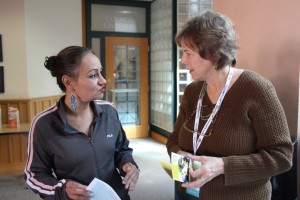It was standing-room-only on a sunny Saturday and the questions echoed off the walls in Mountain View City Hall. Will my child be covered through his 26th year or until he turns 26? Can I change health plans? How does the law impact the homeless?

Some questions had a distinctly Silicon Valley flavor: What if you work for a startup and are waiting for funding? Will they adjust your subsidy for your new income?
More than 100 people turned out last Saturday to learn about the Affordable Care Act during an eventful week for the controversial law: Health care exchanges opened across the country Oct. 1, computer glitches frustrated thousands, and political wrangling shut down the federal government. Two state lawmakers, Assemblyman Rich Gordon (D-Menlo Park) and Sen. Jerry Hill (D-San Mateo), sponsored the forum that featured a panel of local government representatives and health policy experts.
In the audience, the reasons for coming were as diverse as the questions asked.
Jennifer Griesman, an apartment manager from Sunnyvale, was there with her 22-year-old son, Anthony Michael Perez. She said they have been uninsured for four years and mostly avoided hospitals in favor of “home remedies and cures” because she can’t afford medical bills. Hearing about the Affordable Care Act sparked her interest.
Being eligible for coverage, she said, “brings a tear to your eye.”
Others were there to gain the knowledge needed to spread the word in their communities. Minnie Lin has insurance through her employer, but she is motivated to help her friends — immigrants from China, who as U.S. permanent residents qualify to enroll in the exchanges. “They didn’t know much English so that’s why I came to help.”
Janet Wells is a volunteer for Mid-Peninsulans for Affordable Care, a group that does community outreach about the law. “A lot of the people who are uninsured haven’t a clue about what is going on,” she said. “There’s so many people [who] have no idea, and a few that have heard some things are just confused about what they need to do.”
Gordon came up with the idea for the forum after his office was flooded with calls from constituents who had questions about the law. “Why not answer questions for many people at once?” he concluded.

A Kaiser Health Tracking Poll in August showed that 51 percent of Americans feel they don’t have enough information about the Affordable Care Act to understand how it will impact them or their family. The poll showed that federal and state agencies topped the list of trusted sources of information, second only to doctors or nurses.
But while 33 percent of those surveyed said they would trust information from a state agency “a lot,” 16 percent had actually heard information about the law from a state agency.
On hand to answer questions were Anthony Wright, executive director of Health Access California; Cary Sanders, director of policy analysis for California Pan-Ethnic Health Network; Drew Kyler, external affairs for Covered California; Ed Kiryczun, manager for San Mateo County’s Health and Human Services Agency, and Denise Boland, director of employment and benefit services for Santa Clara County’s Social Service Agency.
Wright cautioned against rushing into any health insurance plan. “This is a big purchase,” he said, and urged people to “kick the tires” before deciding on a particular plan. Wright also warned about coinsurance — a type of “cost-sharing” that differs among health plans. It represents a percentage of a medical bill that might have to be covered by a consumer.
Typically, plans with lower monthly premiums may come with higher cost-sharing obligations. “It may say 20 percent but 20 percent of what?” Wright said. “People who don’t have lots of interaction with the health-care system don’t know how expensive these bills can be.”
On hand to provide information were educators like Beth Thomas who were trained by Covered California, the state’s health insurance exchange. Thomas’s employer, a labor union representing public workers, has received a state grant to spread the word about the Affordable Care Act.
She was surprised by the diversity of people at the forum. “We’re thinking that we’re going to be dealing with people who are low income…but this is a population who is completely different from that and they have the same insurance issues…It’s across the spectrum.”
